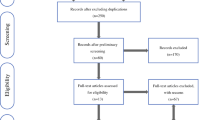Abstract
Purpose
There is no consensus about the impact of a high BMI on postoperative morbidity and survival after esophagectomy. The aim of this study was to determine the influence of a high BMI on postoperative complications and survival in a large cohort of esophageal cancer patients.
Methods
From January 2006 to December 2012, 1,342 consecutive esophageal cancer patients who underwent esophagectomy were included in this study. Patients were divided into three groups: 950 patients were classified as normal BMI (BMI 18.5–24.9 kg/m2), 279 were classified as high BMI (BMI ≥ 25 kg/m2), and 113 as low BMI (BMI < 18.5 kg/m2). Multivariate logistic regression models were used to identify confounding factors associated with postoperative complications. The impact of BMI on overall survival (OS) was estimated by the Kaplan–Meier method and Cox proportional hazard models.
Results
The predominance of pathological type was esophageal squamous cell carcinoma (n = 1,280, 95.4 %). Overall morbidity, mortality, and hospital stay did not differ among groups. The incidence of pneumonia was higher in patients with high BMI compared with those with normal BMI (14.7 vs. 9.9 %, P = 0.025). However, chylothorax was less frequent in high-BMI group (0.4 % in high-BMI group, 3.1 % in normal group, and 3.5 % in low group, P = 0.011). Logistic regression analysis revealed high BMI was independently associated with decreased incidence of chylothorax [HR 0.86; 95 % confidence interval 0.76–0.97]. Overweight and obese patients had significantly better overall survival than underweight patients (median OS 55.6 vs. 32.5 months, P = 0.013), while the pathological stage was significantly higher in underweight patients (P = 0.001). In multivariate analysis, T status, N status, differentiation grade, and tumor length were identified as independent prognostic factors.
Conclusion
A high BMI is not associated with increased overall morbidity following esophagectomy; moreover, it is associated with decreased incidence of chylothorax. The better overall survival in patients with high BMI compared with those with low BMI might be due to a relatively low pathological stage. A high BMI should therefore not be a relative contraindication for esophagectomy.


Similar content being viewed by others
References
Blom RL, Lagarde SM, Klinkenbijl JH et al (2012) A high body mass index in esophageal cancer patients does not influence postoperative outcome or long-term survival. Ann Surg Oncol 19:766–771
Grotenhuis BA, Wijnhoven BP, Hötte GJ et al (2010) Prognostic value of body mass index on short-term and long-term outcome after resection of esophageal cancer. World J Surg 34:2621–2627
Hayashi Y, Correa AM, Hofstetter WL et al (2010) The influence of high body mass index on the prognosis of patients with esophageal cancer after surgery as primary therapy. Cancer 116:5619–5627
Healy LA, Ryan AM, Gopinath B, Rowley S, Byrne PJ, Reynolds JV (2007) Impact of obesity on outcomes in the management of localized adenocarcinoma of the esophagus and esophagogastric junction. J Thorac Cardiovasc Surg 134:1284–1291
Jemal A, Bray F, Center MM, Ferlay J, Ward E (2011) Forman D global cancer statistics. CA Cancer J Clin 61:69–90
Kassis ES, Kosinski AS, Ross P Jr, Koppes KE, Donahue JM, Daniel VC (2013) Predictors of anastomotic leak after esophagectomy: an analysis of the society of thoracic surgeons general thoracic database. Ann Thorac Surg 96:1919–1926
Kayani B, Okabayashi K, Ashrafian H et al (2012) Does obesity affect outcomes in patients undergoing esophagectomy for cancer? a meta-analysis. World J Surg. 36:1785–1795
Pennathur A, Gibson MK, Jobe BA, Luketich JD (2013) Oesophageal carcinoma. Lancet 381:400–4012
Ryan AM, Rowley SP, Fitzgerald AP, Ravi N, Reynolds JV (2006) Adenocarcinoma of the esophagus and gastric cardia: male preponderance in association with obesity. Eur J Cancer 42:1151–1158
Scarpa M, Cagol M, Bettini S et al (2013) Overweight patients operated on for cancer of the esophagus survive longer than normal-weight patients. J Gastrointest Surg 17:218–227
Scipione CN, Chang AC, Pickens A et al (2007) Transhiatal esophagectomy in the profoundly obese: implications and experience. Ann Thorac Surg 84:376–382
Shah RD, Luketich JD, Schuchert MJ et al (2012) Postesophagectomy chylothorax: incidence, risk factors, and outcomes. Ann Thorac Surg 93:897–903
Watanabe M, Ishimoto T, Baba Y et al (2013) Prognostic impact of body mass index in patients with squamous cell carcinoma of the esophagus. Ann Surg Oncol 20:3984–3991
Yoon HH, Lewis MA, Shi Q et al (2011) Prognostic impact of body mass index stratified by smoking status in patients with esophageal adenocarcinoma. J Clin Oncol 29:4561–4567
Zhang SS, Yang H, Luo KJ et al (2013) The impact of body mass index on complication and survival in resected oesophageal cancer: a clinical-based cohort and meta-analysis. Br J Cancer 109:2894–2903
Acknowledgments
We would like to thank the authors of the studies included in our manuscript.
Conflict of interest
We declare that no benefits in any form have been received or will be received from a commercial party related directly or indirectly to the subject of this article. We also declare that we have no conflict of interest in connection with this paper.
Author information
Authors and Affiliations
Corresponding author
Rights and permissions
About this article
Cite this article
Miao, L., Chen, H., Xiang, J. et al. A high body mass index in esophageal cancer patients is not associated with adverse outcomes following esophagectomy. J Cancer Res Clin Oncol 141, 941–950 (2015). https://doi.org/10.1007/s00432-014-1878-x
Received:
Accepted:
Published:
Issue Date:
DOI: https://doi.org/10.1007/s00432-014-1878-x




